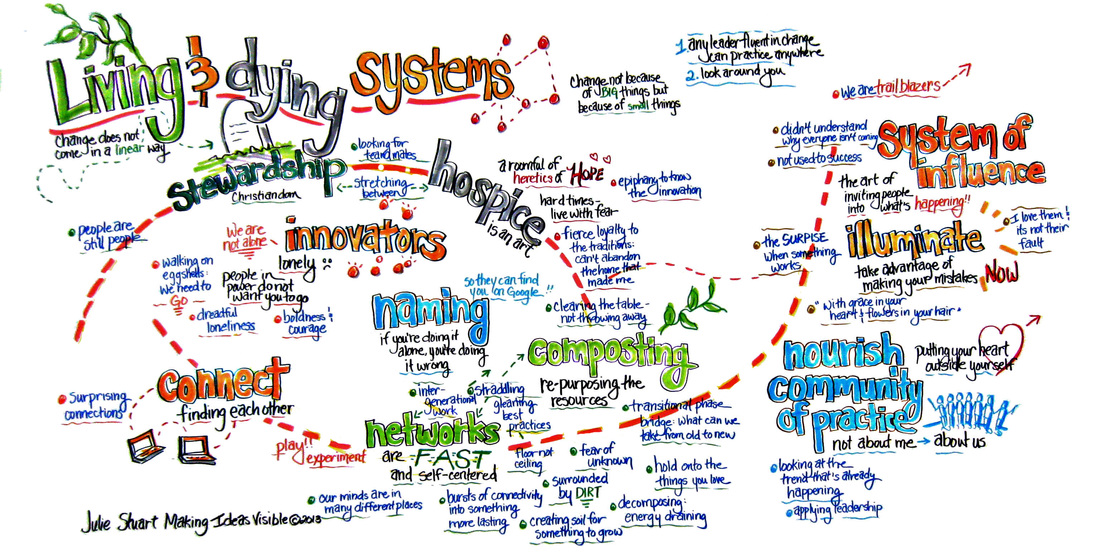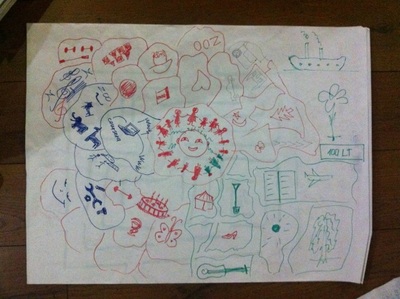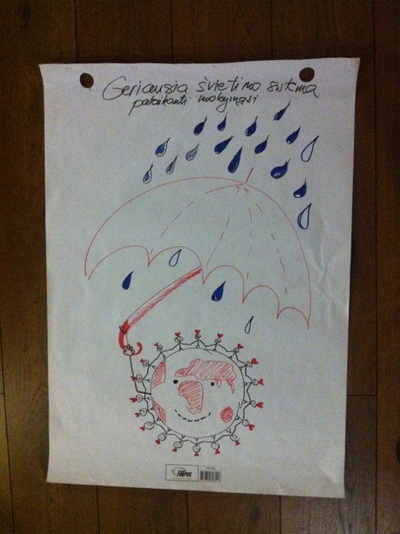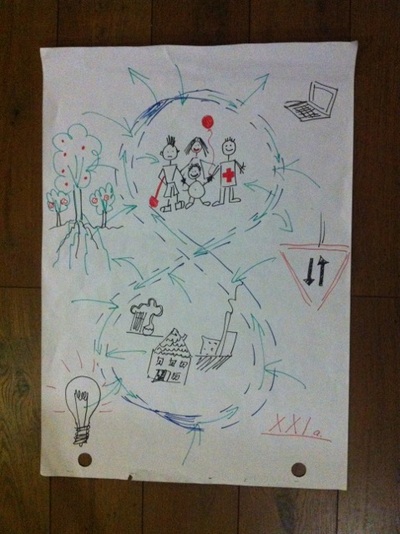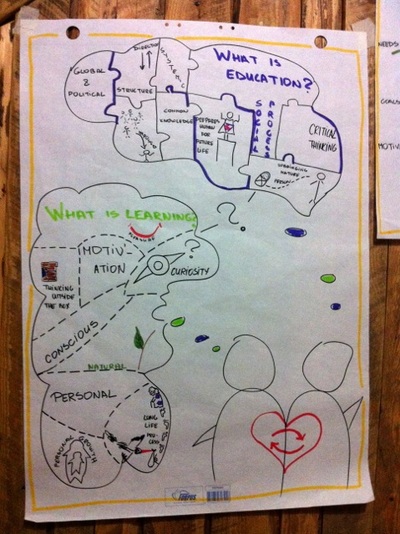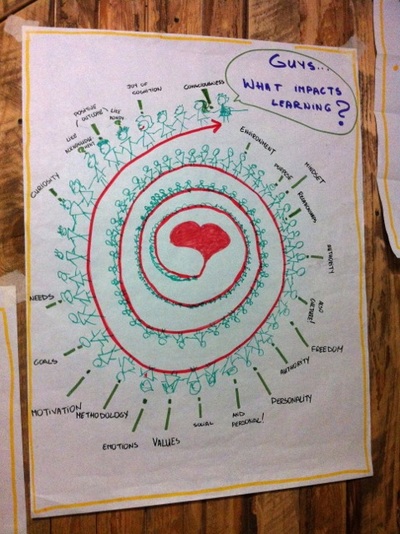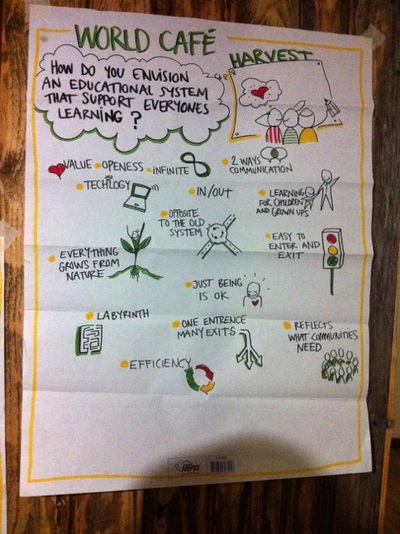DAY 2 SUMMARY In Lithuanian, by Liucija Lenkauskaitė
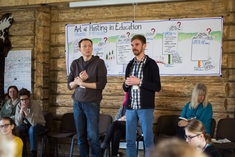
Bėgant antrajai renginio dienai, dalyviai
susipažino su pokalbių meno technikomis išsamiau. Nuo pat ankstyvo ryto
mokymai, pasakojimai ir diskusijos susipynė į tarpusavio supratimo giją.
Pirmoji sesija prasidėjo Lauros Weisel istorija, kurioje ji pasakojo apie savo įsitraukimą į dalyvaujantįjį mokymą. Ji pabrėžė tai, kad apie metodus, naudojamus JAV mokyklose, ji sužinojo iš europiečio. Tai tik parodė pažinčių rato poveikį ir išėjimo iš savo komforto zonos naudą (komforto zona šiuo atveju buvo gyvenamoji šalis).
Vėliau dalyviai dalinosi nuomone apie pagrindinius mokymosi lūžio taškus tiek švietimo sistemoje, tiek asmeniniame gyvenime. Dažnai minėtos ir daug aptartos buvo Sovietų sąjungos griūtis ir Švietimo reforma.
Aurimas Ražanauskas ir Diederickas Bosscha susirinkusiems pristatė tradicinės ir neformaliosios švietimo sistemų kreives, vingiuojančias tarp laiko ir sėkmės ašių. Ši schema sukėlė aistringų diskusijų bangą apie tai, kur turi vesti tos kreivės ir apie tai, kokiuose vaidmenyse dalyviai save mato. Pasaulio Kavinės užduotis vėl suvienijo dalyvius dalintis savo nuomone apie mokymosi ir švietimo panašumus ir skirtumus. Iš šios sesijos buvo gauta daug įvairaus grafinio derliaus. Dalyviai kūrybingai vaizdavo tobulą švietimo sistemą, kuri tenkintų visų poreikius.
Žmonių, geriančių kavą, sėdinčių ant žemės, dirbančių įvairiose erdvėse sūkuryje, dalyviai pažino vienas kitą, o svarbiausia, patys save geriau. Jų laukė trečia renginio diena.
Pirmoji sesija prasidėjo Lauros Weisel istorija, kurioje ji pasakojo apie savo įsitraukimą į dalyvaujantįjį mokymą. Ji pabrėžė tai, kad apie metodus, naudojamus JAV mokyklose, ji sužinojo iš europiečio. Tai tik parodė pažinčių rato poveikį ir išėjimo iš savo komforto zonos naudą (komforto zona šiuo atveju buvo gyvenamoji šalis).
Vėliau dalyviai dalinosi nuomone apie pagrindinius mokymosi lūžio taškus tiek švietimo sistemoje, tiek asmeniniame gyvenime. Dažnai minėtos ir daug aptartos buvo Sovietų sąjungos griūtis ir Švietimo reforma.
Aurimas Ražanauskas ir Diederickas Bosscha susirinkusiems pristatė tradicinės ir neformaliosios švietimo sistemų kreives, vingiuojančias tarp laiko ir sėkmės ašių. Ši schema sukėlė aistringų diskusijų bangą apie tai, kur turi vesti tos kreivės ir apie tai, kokiuose vaidmenyse dalyviai save mato. Pasaulio Kavinės užduotis vėl suvienijo dalyvius dalintis savo nuomone apie mokymosi ir švietimo panašumus ir skirtumus. Iš šios sesijos buvo gauta daug įvairaus grafinio derliaus. Dalyviai kūrybingai vaizdavo tobulą švietimo sistemą, kuri tenkintų visų poreikius.
Žmonių, geriančių kavą, sėdinčių ant žemės, dirbančių įvairiose erdvėse sūkuryje, dalyviai pažino vienas kitą, o svarbiausia, patys save geriau. Jų laukė trečia renginio diena.
THE TWO LOOPS DIAGRAM
WORLD CAFE
Round 1: What is learning? What is education?
Round 2: What impacts learning?
Round 3: How would you envision an educational system that supports everyone’s learning? (represent in graphic form!)
Harvest Summary (by Laura Weisel)
Round 2: What impacts learning?
Round 3: How would you envision an educational system that supports everyone’s learning? (represent in graphic form!)
Harvest Summary (by Laura Weisel)
- Learning is a personal, lifelong, natural process that occurs in your brain. Learning is driven by exploring and acquiring information and skills that address both needs and curiosity. Learning is personal, often occurring unintentionally, can be physical and spiritual, and happens when a person is alone or in groups.
- Education is the process of imparting or acquiring knowledge and skills, can be structured, systematic, formal or informal, and is driven by personal, community, societal, and global needs or wants that can be immediate or long-term.
- Learning is impacted by curiosity, creativity, personal and societal needs, the learning environment and methodology, culture, motivation, opportunities, and luck. Time, practice, goal/purpose, attitude, personal relations, and the competencies of professional educators impact the quality of learning.
- We envision an educational system that is flexible and
welcoming with multiple points of entry and exit, offering formal and
informal opportunities for youth and adults. The system will be
co-created, holistic, connected to real life, and supported by
partnerships within the community. The educational system will be
responsible for supporting, through policy and funding, equal
opportunities to all who want to learn, in all regions, including individuals with disabilities and other unique learning needs.
- Mokymasis yraasmeninis , visą , natūralus procesas , kuris vyksta jūsų smegenyse. Mokymasis skatina tyrinėti ir įgyti informacijos ir įgūdžių , kad spręstų poreikius ir smalsumą. Mokymasis yra asmeninė , kaip dažnai būna netyčia , gali būti fizinė ir dvasinė , ir atsitinka, kaiasmuo yra vienas arba grupėmis.
- Švietimasperteikimo ar įgyti žinių ir įgūdžių, procesas , gali būti sudarytas , sisteminga, formalus ar neformalus ir lemia asmens , bendruomenės, visuomenės ir pasaulio poreikius arba nori , kad gali būti tiesioginis arba ilgalaikis.
- Mokymosi trenkiasi smalsumą , kūrybiškumą, asmens ir visuomenės poreikius , mokymosi aplinką ir metodikos , kultūros , motyvacijos, galimybių ir sėkmės. Laikas , praktika, tikslas / paskirtis , požiūris , asmens santykiai, ir profesionalių pedagogų kompetencijų įtakos mokymosi kokybei .
- Mes įsivaizduoti švietimo sistemą, kuri yra lanksti ir draugiška su keliais įvažiavimo ir išvažiavimo , siūlanti formalius ir neformalius galimybių jaunimui ir suaugusiems. Sistema bus bendrai sukurtas visoms suinteresuotosioms šalims , kompleksinės , susijusių su realiu gyvenimu , ir remia partnerystę bendruomenėje projektus . Švietimo sistema bus atsakingas už paramą per politikos ir finansavimo , lygias galimybes visiems, kurie nori mokytis, visuose regionuose , įskaitant asmenų su negalia ir kitų unikalių mokymosi poreikius .
As part of the harvest from the World Café, three participants have written their own personal reflections on the conversations and the process.
|
Story 1 - Kotryna
In the afternoon we ‘chose’ our table in World cafe, which actually did not have any tables. This was one of the nice jokes by our World café host, Andrius. The jokes contributed to the good atmosphere and the energy of the activity. No doubt the humor is one of the most beautiful qualities of a good host as participatory activities are supposed to be playful and creative. The set of good questions let the participants go deep into the topic of good education. The first discussion - about the concepts of learning and education - ended in the conclusion, that education and learning can become ‘one’ if the meaning (or the goal) is clear. As our student Ieva commented: “you can learn with interest and joy when you understand how you will use it”. A big smile was shining/shone on Ieva’s face when she heard that learning is a two way process and the student teaches his teachers as well. The conversation at the second table started with sharing the first round discoveries and it was an amazing opportunity to find out how many different aspects the same topic can have. And in the process of collecting the ideas of what makes impact on learning participants could hardly wait for their turn to share the ideas. Every round made the picture clearer and the conversation flow - more natural and easy. The introduction of new forms made the experience even more interesting. As the imagination was employed we had this nice experience of how the images of one person can evoke the pictures in another person’s imagination. As the result, we got very interesting, unexpected, different metaphors of good education as the never ending Mobius strip, a river, a road, a labyrinth or a tree representing openness, infinity, naturalness and other important qualities of a good education system. For sure, the activity was a live and involving process of co-creating together. |
Story 2 - Ana
Toke told us that today again and his grace was present also when he presented us the essence of Art of Hosting, as he sees it. There is something about the way he speaks and addresses the group that makes me absorb each and every word of his. He speaks clear and with patience, carefully saying and taking care of each word. From the stories he shared there were few quotes that stuck with me: We need to learn the discipline of silence. So that you know, whenever a group gets naturally to silence, it rises to its next level. Remember, everything is a circle. If you do something deliberately, it will give better fruits. Learn to host yourself. We don’t have time for this, we are being busy changing the world. Just practice it … by far the most received advice in Art of Hosting so far. Common ground Later in the day we went on to World Cafe, exploring the questions shown above. I hosted one table and my personal responses to the questions goes like this:
To read Anas full blogpost click here |
Story 3 - Vaiva
Oh, yes, those people are really excited about education. I have never heard such passionate and enthusiastic talks about education in all my life. I am curios, if something would change in this field if politicians shared the same enthusiasm?
Anyway, today the main topic was – don‘t be surprised – about learning and education. What is the first and the second and how they interact, what does impact learning and how we could create an educational system which could fullfill the needs of the whole society. Especially, I liked one idea that learning helps to think outside the box and education learns to think inside the box. Of course, this idea should be put in discussion but I liked the stress on motivation. I think, learning is all about that. You choose what you want to learn and the intensity of the process. And what about education? Yes, motivation is important too but the thing is more about what knowledge you HAVE to put in your head. SOMENONE ELSE decide what is important for you to know. Here magic of exploring goes away – when you can‘t choose what is important to you, naturally, your engagement to this process goes down. Of course, results too.
I think, if education would be more flexible and could give exactly what students want and need, there wouldn‘t be this problem. Yeah, yeah, I know, what you are thinking – what about the money, how it is even possible for educators to do that, when they have to work with so many different students etc. And I don‘t know but it would be a really joyful thing if we could solve this quest and find the holy grail J
Oh, yes, those people are really excited about education. I have never heard such passionate and enthusiastic talks about education in all my life. I am curios, if something would change in this field if politicians shared the same enthusiasm?
Anyway, today the main topic was – don‘t be surprised – about learning and education. What is the first and the second and how they interact, what does impact learning and how we could create an educational system which could fullfill the needs of the whole society. Especially, I liked one idea that learning helps to think outside the box and education learns to think inside the box. Of course, this idea should be put in discussion but I liked the stress on motivation. I think, learning is all about that. You choose what you want to learn and the intensity of the process. And what about education? Yes, motivation is important too but the thing is more about what knowledge you HAVE to put in your head. SOMENONE ELSE decide what is important for you to know. Here magic of exploring goes away – when you can‘t choose what is important to you, naturally, your engagement to this process goes down. Of course, results too.
I think, if education would be more flexible and could give exactly what students want and need, there wouldn‘t be this problem. Yeah, yeah, I know, what you are thinking – what about the money, how it is even possible for educators to do that, when they have to work with so many different students etc. And I don‘t know but it would be a really joyful thing if we could solve this quest and find the holy grail J
